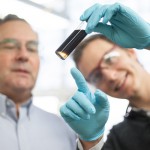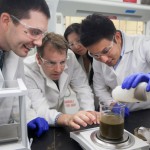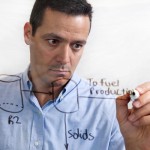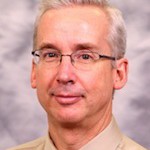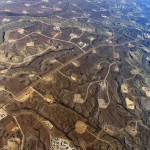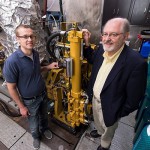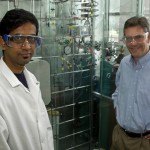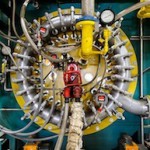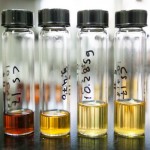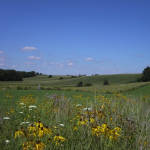Tag Energy
Helping Wisconsin dairy farms produce ‘brown gold’
In the heart of Wisconsin, a project is underway to produce energy from a resource in little danger of running low: cow manure, also known as "brown gold."
Johnson Controls partners with UW–Madison to reduce commercial energy costs
Johnson Controls began when founder Warren Johnson invented the thermostat in 1885, and today the Milwaukee-based controls company is working toward another major innovation in heating and cooling in collaboration with UW–Madison chemical engineers. A research group led by Jim Rawlings, the Paul A. Elfers professor and W. Harmon Ray professor of chemical and biological engineering, has partnered with Johnson Controls to develop better HVAC control systems for its clients in large commercial buildings.
New fiber-optic monitoring tools could help industry unlock geothermal energy
University of Wisconsin–Madison geoscientists and engineers are working with industry partners and the U.S. Department of Energy to develop a highly detailed monitoring system for geothermal wells.
Calculating the future of solar-fuel refineries
A team of University of Wisconsin–Madison engineers has developed a new tool to help plot the future of solar fuels. In a paper recently published in the journal Energy & Environmental Science, a team led by chemical and biological engineering Professors Christos Maravelias and George Huber outlined a tool to help engineers better gauge the overall yield, efficiency and costs associated with scaling solar-fuel production processes up into large-scale refineries.
Scientists get to the heart of fool’s gold as a solar material
As the installation of photovoltaic solar cells continues to accelerate, scientists are looking for inexpensive materials beyond the traditional silicon that can efficiently convert sunlight into electricity.
New master’s program in energy conservation is first of its kind
A new professional master's program will launch at the University of Wisconsin–Madison in fall 2015 and become the first in the world specifically designed to train analytically minded students to evaluate energy efficiency and other resource-conservation initiatives.
New process transforms wood, crop waste into valuable chemicals
Scientists today disclosed a new method to convert lignin, a biomass waste product, into simple chemicals. The innovation is an important step toward replacing petroleum-based fuels and chemicals with biorenewable materials, says Shannon Stahl, an expert in "green chemistry" at the University of Wisconsin–Madison.
Mayor Soglin and international experts to discuss future of cities at UW Energy Summit
MEDIA ADVISORY 10/27/2014
Drilling in the dark: Biological impacts of fracking still largely unknown
As production of shale gas soars, the industry's effects on nature and wildlife remain largely unexplored, according to a study by a group of conservation biologists published in Frontiers in Ecology and the Environment on August 1.
Best-ever efficiency points to clean, green gas-diesel engine
The one-cylinder test engine in the basement of a University of Wisconsin–Madison lab is connected to a life-support system of pipes, tubes, ducts and cables. You might think that the engine resembles a patient in intensive care, but in this case, the patient is not sick. Instead, the elaborate monitoring system shows that the engine can convert 59.5 percent of the chemical energy in its fuel into motion — significantly better than the 52 percent maximum in modern diesel truck engines.
Aviation offers a way forward in biofuels research
Biofuels researchers are increasingly thinking about how the energy market is changing, which challenges them to balance the basic science of new fuels with a more holistic view of the most commercially viable ways to produce them. So when a group of University of Wisconsin–Madison researchers began looking at how to make jet fuel from biomass, they also strived to create a "techno-economic" framework that would illuminate the entire biofuels field.
Wisconsin Energy Institute building receives design awards
The Wisconsin Energy Institute (WEI) at the University of Wisconsin–Madison received Project of the Year and Best Green-Built honors for its dedication to sustainability in design, construction and functionality at this year's Commercial Design Awards.
New, inexpensive production materials boost promise of hydrogen fuel
Generating electricity is not the only way to turn sunlight into energy we can use on demand. The sun can also drive reactions to create chemical fuels, such as hydrogen, that can in turn power cars, trucks and trains.
Charter Street Heating Plant keeps campus comfortable
The Charter Street Heating Plant is responsible for keeping the 65,000 people who work and study on campus in more than 300 buildings comfortable.
Renewable chemical ready for biofuels scale-up
Using a plant-derived chemical, University of Wisconsin–Madison researchers have developed a process for creating a concentrated stream of sugars that’s ripe with possibility for biofuels.
Perennial energy crops could provide environmental benefits
Rows of corn and soybeans cover rolling hills, stitched together by creeks and woodlands that compose southwest Wisconsin's agricultural patchwork. These complex landscapes provide clean water, wildlife habitat and climate benefits, yet, historically their value has been measured in just one way: bushels per acre.
Water systems research fills in the details for Africa’s largest dam
When the government of Ethiopia finishes building the Grand Ethiopian Renaissance Dam (GERD) in 2017 or 2018, it will not only have built the largest hydroelectric power-generation plant in Africa, but also stirred up tensions among African nations, and indelibly altered a river that itself has guided millennia of human history in the region.
The chemistry of color: Energy researcher develops dye-based solar cells
University of Wisconsin–Madison researchers working at the intersection of basic and applied science focus on key factors like cost, environmental impacts ... and sometimes, color.
Marginal land in demand: researchers explore farmer willingness to grow energy crops
In their quest to make cellulosic biofuel a viable energy option, many researchers are looking to marginal lands - those unsuitable for growing food - as potential real estate for bioenergy crops. However, few people have asked: how do farmers feel about using their marginal lands for fuel production?

